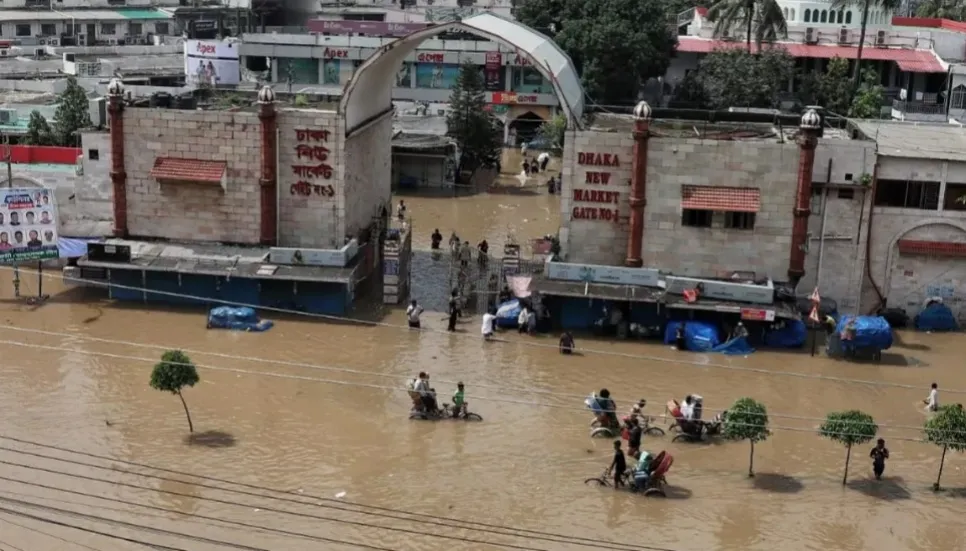
Despite multiple master plans aimed at resolving waterlogging, Dhaka continues to suffer from severe flooding after heavy rainfall. Residents of the capital are frequently subjected to immense hardships as many areas become submerged, bringing the city to a standstill.
While several ambitious drainage projects were undertaken around Dhaka's rivers and canals, these efforts have not yielded the desired results. A few hours of heavy rain are enough to flood large parts of the city, leaving key streets and neighbourhoods under knee-deep or waist-high water.
Local commuters face further challenges as public transportation becomes scarce during heavy rains. As a result, many are forced to rely on rickshaws and CNG-run auto-rickshaws, whose drivers often take advantage of the situation by doubling fares.
Over Tk 750cr spent, but problems persist
Over the past five years, the Dhaka North and South City Corporations have spent over Tk 750 crore on canal restoration and drainage improvements. Yet, these efforts have failed to provide permanent relief from waterlogging.
Experts cite poor maintenance and monitoring as major contributors to the crisis. Adil Muhammad Khan, an urban planner, told UNB, “The projects implemented so far have not been well-coordinated or executed efficiently. The lack of regular maintenance of drainage systems, canals, and box culverts means that they quickly become clogged with plastic waste, blocking the flow of water and leading to severe flooding.”
Khan also highlighted the lack of coordination between city corporations and other government agencies, resulting in a blame game that stretches from one rainy season to the next. “Projects are launched, money is spent, but no one is held accountable for the results. After each heavy rain, the water channels become clogged again because of improper maintenance,” he added.
City corporations defend actions
Dhaka South City Corporation (DSCC) Chief Executive Mizanur Rahman explained that cleaning and maintenance efforts are ongoing but have limitations. “We've cleared drains in many areas, but heavy rain can still overwhelm the system,” he said.
Dhaka South has so far spent Tk 350 crore on drainage and water management projects. This includes restoring several canals and improving drainage capacity in high-risk areas. Despite this, major roads in areas like Dhanmondi, Green Road, and New Market continue to be submerged after heavy rains, disrupting daily life and damaging properties.
Flood-prone zones and future plans
Waterlogging remains a common sight in neighbourhoods such as Bashundhara, Badda, Rampura, Fakirapul, and Mirpur. Even prime commercial areas like Shantinagar, Malibagh, and Karwan Bazar are not spared. These streets flood with knee-high water, leaving vehicles stranded and causing severe traffic jams.
The DSCC has already completed work on 104 out of 136 identified waterlogging-prone zones, with the rest still underway. “The flooding issue will not be resolved until the canals are fully restored,” said Mizanur Rahman.
To this end, the city has launched a Tk 898 crore project, scheduled for completion by 2027, which aims to beautify and restore four key canals in the southern part of Dhaka. Officials believe this will significantly reduce waterlogging in the future.
Dhaka North City Corporation (DNCC) also reported spending Tk 300 crore on canal and drainage restoration in recent years. Despite these investments, continuous maintenance is essential to keep the water flowing.
Natural Drainage Destroyed
Urban planners point out that much of the problem stems from Dhaka’s natural drainage system being filled in and replaced with box culverts. “We have strangled our rivers and canals, which used to serve as natural drains. Now, we're spending millions on recovering and restoring them, but it's too late,” Khan said, pointing to the loss of Dhaka’s once-functioning water management systems.